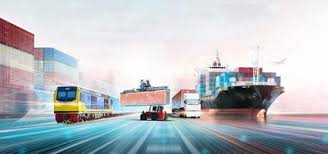

 1. Real-Time Tracking and GPS Integration
One of the biggest game-changers in logistics is real-time tracking. GPS technology allows companies to monitor shipments at every stage, ensuring transparency and improving customer satisfaction. With real-time updates, businesses can proactively address delays and optimize routes for faster deliveries.
2. Artificial Intelligence (AI) and Automation
AI-powered logistics solutions are streamlining operations like never before. Automated warehouses use AI-driven robotics to handle inventory management, reducing human errors and increasing efficiency. AI algorithms also help optimize delivery routes, predict demand, and improve decision-making in supply chain management.
3. Internet of Things (IoT) for Smart Logistics
IoT devices are revolutionizing logistics by connecting different elements of the supply chain. Sensors installed on vehicles and shipments provide real-time data on temperature, humidity, and other critical conditions, ensuring the safe transport of sensitive goods such as pharmaceuticals and perishable foods.
4. Blockchain for Transparency and Security
Blockchain technology enhances the security and transparency of logistics transactions. By providing a decentralized and tamper-proof ledger, blockchain reduces fraud and ensures authenticity in supply chain records. This technology is particularly beneficial in international trade, where documentation and compliance play a crucial role.
5. Sustainable and Green Logistics
Sustainability is becoming a top priority in logistics. Companies are adopting eco-friendly practices such as electric delivery vehicles, carbon-neutral shipping, and optimized route planning to reduce fuel consumption. Green logistics not only helps the environment but also improves a company’s reputation and regulatory compliance.
6. Drones and Autonomous Vehicles
The rise of autonomous vehicles and drone deliveries is set to revolutionize last-mile logistics. Companies like Amazon and DHL are already testing drone deliveries to speed up shipping times and reduce costs. Self-driving trucks, on the other hand, are expected to enhance long-haul transportation by minimizing human intervention and improving efficiency.
Final Thoughts
The logistics industry is undergoing a digital transformation that is reshaping how goods are transported and delivered. By embracing these technological advancements, logistics companies can stay ahead of the competition, enhance operational efficiency, and provide better services to customers. As technology continues to evolve, the future of logistics looks more promising than ever.
At [Your Company Name], we are committed to leveraging cutting-edge technologies to provide seamless and reliable logistics solutions. Contact us today to learn more about how we can streamline your supply chain operations!
1. Real-Time Tracking and GPS Integration
One of the biggest game-changers in logistics is real-time tracking. GPS technology allows companies to monitor shipments at every stage, ensuring transparency and improving customer satisfaction. With real-time updates, businesses can proactively address delays and optimize routes for faster deliveries.
2. Artificial Intelligence (AI) and Automation
AI-powered logistics solutions are streamlining operations like never before. Automated warehouses use AI-driven robotics to handle inventory management, reducing human errors and increasing efficiency. AI algorithms also help optimize delivery routes, predict demand, and improve decision-making in supply chain management.
3. Internet of Things (IoT) for Smart Logistics
IoT devices are revolutionizing logistics by connecting different elements of the supply chain. Sensors installed on vehicles and shipments provide real-time data on temperature, humidity, and other critical conditions, ensuring the safe transport of sensitive goods such as pharmaceuticals and perishable foods.
4. Blockchain for Transparency and Security
Blockchain technology enhances the security and transparency of logistics transactions. By providing a decentralized and tamper-proof ledger, blockchain reduces fraud and ensures authenticity in supply chain records. This technology is particularly beneficial in international trade, where documentation and compliance play a crucial role.
5. Sustainable and Green Logistics
Sustainability is becoming a top priority in logistics. Companies are adopting eco-friendly practices such as electric delivery vehicles, carbon-neutral shipping, and optimized route planning to reduce fuel consumption. Green logistics not only helps the environment but also improves a company’s reputation and regulatory compliance.
6. Drones and Autonomous Vehicles
The rise of autonomous vehicles and drone deliveries is set to revolutionize last-mile logistics. Companies like Amazon and DHL are already testing drone deliveries to speed up shipping times and reduce costs. Self-driving trucks, on the other hand, are expected to enhance long-haul transportation by minimizing human intervention and improving efficiency.
Final Thoughts
The logistics industry is undergoing a digital transformation that is reshaping how goods are transported and delivered. By embracing these technological advancements, logistics companies can stay ahead of the competition, enhance operational efficiency, and provide better services to customers. As technology continues to evolve, the future of logistics looks more promising than ever.
At [Your Company Name], we are committed to leveraging cutting-edge technologies to provide seamless and reliable logistics solutions. Contact us today to learn more about how we can streamline your supply chain operations!